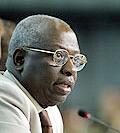 聯合國糧農組織(UN Food and Agriculture Organization,FAO)執行長狄伍夫博士(Dr. Jacques Diouf)憂心地表示,全球金融危機將導致富裕政府減少對開發中國家進行糧食及農業援助,並引進貿易保護主義者(protectionist)的手段,阻止他們國家農業產品出口。
聯合國糧農組織(UN Food and Agriculture Organization,FAO)執行長狄伍夫博士(Dr. Jacques Diouf)憂心地表示,全球金融危機將導致富裕政府減少對開發中國家進行糧食及農業援助,並引進貿易保護主義者(protectionist)的手段,阻止他們國家農業產品出口。
狄伍夫10月14日指出:「全球金融危機不應該讓我們大家忘記糧食危機的問題。私人借款、向銀行借貸、官方的開發援助、外國直接的投資與外勞匯款(worker's remittances)都可能因繼續加深的金融危機而被牽累。」
狄伍夫在這週舉行的聯合國糧農組織全球糧食安全委員會(Committee on World Food Security)議中警告說,儘管目前2008年穀類收成已如預期可達紀錄高點,但是如果這些援助都減少了,明年將可能有另一波的糧食危機。
這個會議是為了彰顯世界糧食日(World Food Day)而在每年的10月16日舉辦,這一天是源自1945年成立聯合國糧農組織,這個組織是聯合國第一個為了強調全球飢餓問題而產生的。
狄伍夫警告說:「現在很高的不確定性籠罩著國際市場,而全球衰退的威脅可能使很多國家傾向採取貿易保護主義(protectionism),並且傾向重新評估他們對國際開發援助上的承諾」。
狄伍夫表示,糧農組織最近公布的作物前景和全球糧食形勢報告顯示,穀物收成量將預計增加4.9%,達到22億3千2百萬公噸。但是仍然有36個國家因為農作失敗、衝突事件、社會不安全或是地方糧價高漲而仍然極需要外國的援助。
狄伍夫提醒說,在糧食價格高漲之後,全球金融危機緊跟著到來,使全球在2007年間額外增加7500萬陷於飢餓及貧窮的人們,這可能會再加重開發中國家窮人們的困境。迪伍夫表示:「去年的困境像是在熱鍋上,明年這樣的困境就可能像是跳進火坑。」
在預期穀物收成狀況良好及世界經濟活動趨緩之下,日用商品價格現在正在下降。
但是狄伍夫警告說,這也可能意味著糧食輸出國會減少種植,進一步減少收成量。假使穀物持續維持低庫存狀況,明年糧食價格將會再回到紀錄高點,這對數百萬到時後將會僅存少許金錢而且沒有信用額度的人們來說,將會是一場災難。
他表示:「如果這個預測成為事實,而最近啟動加強對開發中國家農業進行國際援助的政治意願也泡沫化,那就太不幸了。」
Dr. Jacques Diouf worries that the global financial crisis will cause wealthy governments to reduce food and agriculture aid to developing countries and introduce protectionist measures to keep out their agricultural products.
"The global financial crisis should not make us forget the food crisis," Diouf said Tuesday. "Borrowing, bank lending, official development aid, foreign direct investment and workers' remittances - all may be compromised by a deepening financial crisis."
If aid is reduced, there could be another food crisis next year, despite the record 2008 cereal harvest which is now expected, Diouf warned at the opening of this week's meeting of the UN Food and Agriculture Organization's Committee on World Food Security.
The meeting marks World Food Day, held every year on October 16, the day the Food and Agriculture Organization was founded in 1945 as the first UN agency created to address global hunger.
"The great uncertainty now enveloping international markets and the threat of global recession may tempt countries towards protectionism and towards reassessing their commitments to international development aid," Diouf warned.
Diouf, who heads the FAO, said the organization's latest report on crop prospects and the global food situation shows grain harvests are projected to increase 4.9 percent to a record 2,232 million metric tonnes.
But still, 36 countries are still in need of external assistance as a result of crop failures, conflict or insecurity, or continuing local high prices.
Diouf noted that the financial crisis, following the crisis over soaring food prices that threw an additional 75 million people into hunger and poverty in 2007, may deepen the plight of the poor in developing countries.
"Last year it was the pan," Diouf said. "Next year could be the fire." Commodity prices are currently dropping on the expectation of good grain harvests but also because of a slowing world economy.
But this could mean a cutback in plantings followed by reduced harvests in major exporting countries, Diouf warns. Given continuing low grains stocks, record food prices could return next year - a catastrophe for millions who by then would be left with little money and no credit.
"It would be unfortunate if this were to be the case and the recently mobilized political will towards enhanced international support for developing country agriculture were to evaporate," he said.



